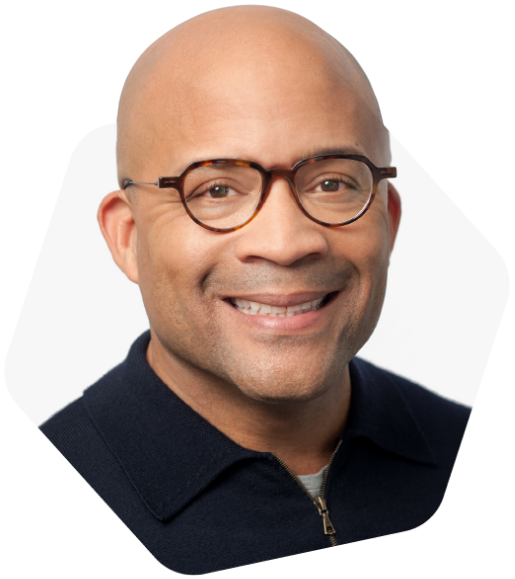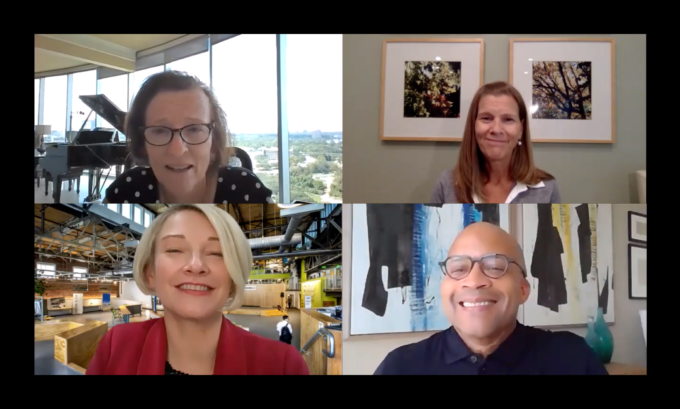As Greentown Labs continues to support our startups through the ongoing impacts of COVID-19, we’ve heard an increased demand within our community for management guidance, advice and the wisdom that comes from experience. While the specifics of our challenges vary, we are all—both professionally and personally—navigating how to lead ourselves, our communities, and our organizations through crisis and ambiguity. To explore best practices for leading during crises, we turned to three senior executives at global corporations who have learned from experience: Barbara Burger of Chevron, Darryl Willis of Microsoft, and Wendy Herrick of Unilever.
At a recent Corporate Voices panel, these three battle-tested members of Greentown’s advisory boards discussed their management experiences, challenging moments in their careers, and advice for emerging leaders during this time. Here’s what they shared:

Wendy Herrick, Unilever
Vice President, Digital Supply Chain
About her role: “We have been on a journey of transforming our supply chain to be more data-driven, consumer-centric, responsive, and agile. This has never proven to be more essential and relevant than during the pandemic, when we’ve seen great change in consumer buying behavior. Digital technology has allowed us to get real-time visibility of our supply chain and has enabled our agility during this crisis.”
Her tips for managing emergencies: “As a leader, you set the tone for the organization. People look to you for leadership. Here are my top tips for leading people through a crisis.”
- People come first. Maintain trust through truth, openness, and honesty. Be empathetic.
- Slow down. Stay calm and positive.
- Step back and look at the full picture, rather than panicking and diving in.
- Get the right people in a group that will lead the emergency response and align on expectations.
- Lean into the unknowns. Be vulnerable, consult others, and be willing to say, ‘I don’t have all the answers.’
In terms of managing others, Herrick added, “Everyone deals with emergencies and crises differently, and you need to keep that in mind.”

Darryl Willis, Microsoft
Vice President, Energy Industry
About his role: “My focus is on helping companies optimize their digital journeys, which have clearly been accelerated by COVID-19, and helping them think through how to accelerate the energy transition. Although many companies are talking about the energy transition, the true test lies in delivering on the promise. That’s where I want to contribute to something big, and where Microsoft can be part of the solution and the journey.”
What he learned about crisis response from his time at BP during its 2010 oil spill: “I learned about the importance of being present, earning trust, following through, and listening more than you talk. I learned the importance of empathy—trying to understand the pain that hundreds of thousands, if not millions, of people were feeling along the Gulf Coast, and doing everything we could, at a human level, to make it right.”

Barbara Burger, Chevron
Vice President Innovation and President, Technology Ventures
About her role: “At the highest level, I bring external innovation to Chevron and Chevron to external innovation. And if we can solve that, I think we will have created a lot of value.”
Her advice for managers: “Be somebody who everyone’s watching, have confidence, and you also need to have an outlet. An outlet is not your team, an outlet is not your organization, but it’s that trusted set of friends that you have where you can get refreshed and share some of your own vulnerabilities. That has been a recipe that’s helped me a lot through the current crisis.”
Leadership lessons she learned early in her career: “I was a supervisor from day one, and I had people working for me that were my dad’s age. I called my dad a lot at first to ask, ‘Is this how you act at work?’ I was 26-years-old, what did I know about what a 50-year-old does at work? I bring that along with me because we are a career employer, we have intergenerational diversity at Chevron. The ability to work with people at very different points in their lives is important.
I learned the real importance of an ally, because there were times when I was in a room and was having a hard time kind of owning my seat. Not having to fight it all by yourself but having that ally who has your back was really important. The concept of allies is something that I’ve used throughout my career.”
Watch the full conversation below!


